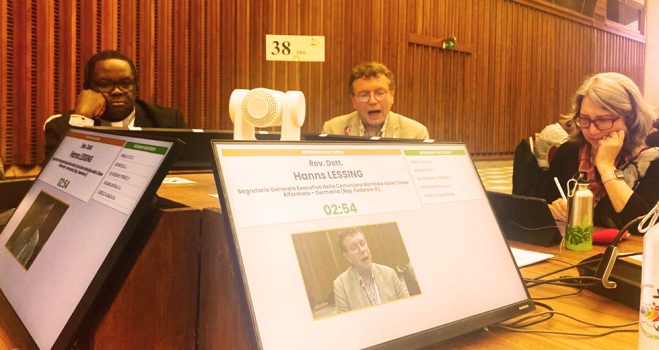The World Communion of Reformed Churches (WCRC), represented by Rev. Dr. Hanns Lessing, Executive Secretary for Communion and Theology, is participating in the Catholic Synod Forum in Rome. Dr. Lessing, who has a voice in the proceedings, joins other delegates in exploring synodality as a means to strengthen communion and shared responsibility within the Church, particularly as it seeks to re-engage with societies increasingly distanced from faith.
During a key session on the concreteness of communion, Dr. Lessing drew on the WCRC’s experiences, particularly the Accra Confession of 2004, which emphasizes justice in response to economic and ecological crises. He spoke about the critical role of marginalized communities in shaping the Church’s mission.
In his intervention, Dr. Lessing welcomed the Catholic Church’s invitation to engage in concrete and synodal communion, and he concluded:
“As Reformed Christians, we believe the Holy Spirit is present in the broken and unfinished, and we find inspiration in the Catholic Church’s movement toward deeper communion,” Lessing remarked.
Other speakers in this session highlighted the importance of sharing gifts within the Church community. Sister Elizabeth Mary Davis from Canada called for an expanded view of communion that includes a relationship with the earth.
“Concrete communion has to include communion with the earth. The current discussion on communion is too anthropocentric,” said Davis.
Dr. Estela Padilla from the Philippines pointed out that the gifts of poor communities are often undervalued, despite their deep faith and perseverance.
“The gifts that poor people bring are often not appreciated. Poor people cannot go to church because they have to work to sustain themselves. But they bring their faith and perseverance,” said Padilla.
Cardinal Gzegorz Rys, Bishop of Lodz, shared the importance of the exchange of gifts between churches, noting that it remains a challenge within the Roman Catholic Church.
“The document describes the exchange of gifts between churches as an important sacramental sign for today’s world,’ but to this day, the Roman Catholic Church does not offer eucharistic hospitality and does not accept Christians from other Christian churches as godfathers and godmothers,” he stated.
The Rome Synod Forum continues to engage in discussions around concrete communion—focusing on the relational, spiritual, and material exchange of gifts between churches, religions, and cultures. This ongoing dialogue seeks to strengthen unity in the Church and aligns with the Synod’s core mission: the proclamation of the Gospel and the fostering of communion in a fragmented and broken world.


